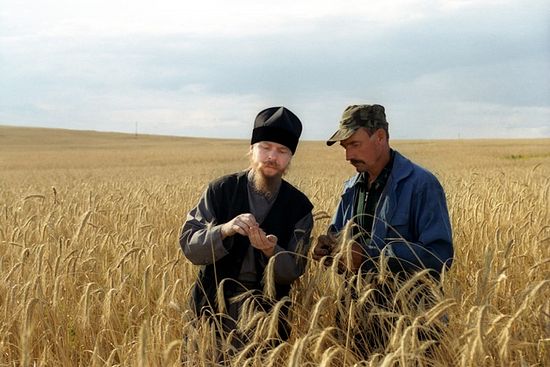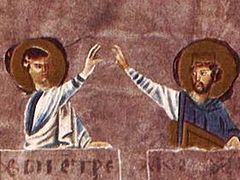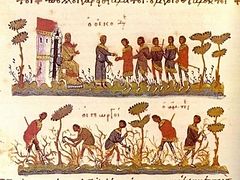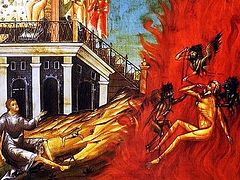The Lord Jesus Christ told the parable of the sower from a boat. The parable appears in the thirteenth chapter of the Gospel according to Matthew and in parallel places in the Gospels according to Mark and Luke. The Lord was preaching from a boat to a crowd of people on the shore of the Sea of Galilee so that He could be heard better. The parable of the sower, the first of Christ's parables in time, is a prophecy of how mankind accepts the Gospel is good tidings in different ways, and how this Gospel acts differently on them, depending on the condition of their souls. The Evangelist Matthew sets forth this parable, thus:
Behold, a sower went forth to sow; and when he sowed, some seeds fell by the way side, and the birds came and devoured them up: some fell upon stony places, where they had not much earth: and forthwith they sprung up, because they had no deepness of earth: and when the sun was up, they were scorched; and because they had no root, they withered away. And some fell among thorns; and the thorns sprung up, and choked them: but others fell into good ground, and brought forth fruit, some a hundredfold, some sixtyfold, some thirtyfold. Who hath ears to hear, let him hear (Matthew 13:1 9).
The parable of the sower has the Lord Himself to interpret it. The Sower is Jesus Christ; the seed is the Word of God. The ground is the human heart. The good heart is the fruitful earth, but the evil heart choked by sins is the earth that is good for nothing. From the Scriptures, we learn that faith cometh by hearing, and hearing by the Word of God (Romans 10:17). So Christ sowed the word of God everywhere in the villages and towns, and in the deserts, and on the sea. He chose His apostles so that they too would sow the Word of God. The apostles appointed their successors—the bishops and presbyters who continue the missionary labor of spreading of sowing the Word of God until this day.
The Church on earth continues the work of Christ. It sows in our hearts the Word of God. When the living Word of God is sown in this sinful nature of fallen man, a new life springs up. All men have some strength to receive the Word of God. True Christian life is constant work on the conversion of one’s own heart, to prepare the ground in oneself to receive the seed. Men can differ in how they approach this task.
Concerning the parable of the sower, let us consider the words of Bishop Theophan the Recluse: Let each “judge for himself as to which category he belongs.” Some people are inattentive and scattered without reverence for the Word of God. Their hearts are like a beaten path, where no good fruit can grow, because the seed of the Divine Word is strewn onto the ground of a coarse soul, trodden by passions, vice, and evil thoughts.
These souls are beaten paths, open to all distractions and commerce, always craving new amusements. Such people let their good thoughts be trampled by a new curiosity. When they may read or hear the Word of God, the enemy of our salvation comes to them secretly, just as the holy, righteous John of Kronstadt says, “like a thief in the house of a careless homeowner, he carries away the Word of God from their hearts, so that they would not believe and be saved.” Such people let the Word of God vanish.
Some of them hear the Word of God for a while, sensitive to anything good, but they take the Word into their minds but not into their hearts. Their surfaces have no depth, and their surface religion is seed wasted along the highway, unable to take root. They attend to the Word of God so that in favorable times, they believe; in misfortune, they betray their faith. They do not want to change their lives, to make them worthy of the Kingdom of Heaven. They tolerate no “unseen warfare,” on the “narrow path” of the Church Fathers. When adversity comes, they throw off their cross and they fall into despair, impatience, and murmuring. And their unrooted Word of God is torn and uprooted, never really sown in the ground of their hearts.
The seeds that fall among the thorns die too, are choked of life by people immersed in time and possessions. Their times are not to blame, their passion for time and possessions is. Such people may hear and understand the Word of God, and take it to heart, until care or temptation attacks them. They torment the Word of God that is cramped and choked in their hearts. No fruit of eternal life can grow because these people are worldly. The Word of God speaks of blessedness in heaven, but these people want distractions and comforts here and now: “We shall receive the good things of heaven someday. But the world is giving its good things to us now.” Some may even understand that repentance is necessary, but they put it off: “We shall repent, we shall prepare for old age,” they think, “but let us seize the days of pleasures here already.” They forget that in old age they have neither strength nor opportunity.
Christ says, He that endureth to the end shall be saved (Matthew 10:22). The seed that falls on good ground falls amid people who hear the Word of God, take it and keep it, resolve to follow it, and to offer their fruit of good deeds. Having learned the fullness of truth, they listen to its Word and serve it. These people follow the witness of Apostle Paul: For not the hearers of the law are just before God, but the doers of the law shall be justified (Romans 2:13).
In the Mystery of the Eucharist, the priest elevates the bread and wine, saying to God: “Thine own of Thine own we offer unto Thee!” That is, “That which is Thine, we offer unto Thee!” So the parable of the sower also touches on “the mysteries of the Kingdom of God.”
To understand this mystery, one’s direction of mind and will must look to the mystery, and one’s heart must be disposed to accept it. The Word of God, the Seed spoken of in the parable, is part of us just as the Divine Word (the Logos) Christ is related to the Father, as His Only begotten, Who with Him constitutes One (cf. John 10:30) and Who coexists with Him from the beginning (John 8:25). Just as the Son lives by the Father (John 6:57) and no one can come unto the Father except through the Son (cf. John 14:6), and He who has seen the Son sees the Father as well (cf. John 14:9), “for the Son has told us everything that He heard from the Father (cf. John 15:15).
The Word of God in the Gospel, sown by Christ in our hearts, is not foreign to us, not an alien book to study outwardly. The Gospel is life in God, present at our conception by the power of the Holy Spirit, which makes us conformable to God and more God-like. The Gospel is not information about strange events recorded by the apostles. The Gospel is the Word of God that explains kinship and communion with God to the human soul.
The Gospel makes the human soul recognize the voice of its Creator, its Heavenly Father, in its own heart. In the language of philosophy, the Word of God is immanent in us; that is, it is “in us, with us, and not outside of us” and not alien to us although it exceeds our mental grasp. The seed of the Kingdom of God sown in us springs up, and grows mysteriously. Scripture says that a man sleeps and rises night and day and does not know how the Kingdom of God springs up in him (cf. Mark 4:27). The seed springs up in him unnoticed, miraculously. We cannot tell whether the seed increases thirtyfold, sixtyfold or a hundredfold. We know only that when our heart begins to burn, as within the disciples at Emmaus, that the Lord Himself is opening our mind to understand the Scriptures (cf. Luke 24:32), introducing His Kingdom to us.
In place of the desire to learn from the Gospel about God, our hearts begin to learn about Him from within our own hearts, showing that the seed has brought forth fruit. We cannot judge the quantity or quality of fruit borne from the seed in us, but we know that all the fruits from Him are too many to return to Him.
In the rhythm of the return to God the Father, the Son of Man on the Cross summed up His earthly life: Father, into thy hands I commend my spirit! In the Liturgy, when we pray for the sending down of the divine grace, we cry out: “Thy own of Thine own we offer unto Thee!”
Regarding the fruits of the seed of the Kingdom of Heaven, God says thus to man: My son, give me thine heart! (Proverbs 23:26). That is, “All that thou hast, O man, thy gifts and talents, thy deeds and thoughts and feelings, all that thou lovest and believest in, that is thy whole life, thy whole heart, give this back to Him Who gave it Thee.” But we must give back to God pure thoughts and feelings, pure love and faith, a pure life and an immaculate heart. Following the psalmist, we make ready to say: Ready is my heart, O God, ready is my heart (Psalm 57:7).
But how do we prepare the heart, make it ready to receive the seed, the Word of God? The parable of the sower concludes with the words He who hath ears to hear, let him hear! Using these words, the Lord knocks at the heart of each man, asking each man to look into his soul, to know what group of people in the parable he belongs to.
In the parable of the sower, Christ asks everyone to receive the Word of God with all his being, to receive it into a pure and good heart. Apostle Paul said of himself: I live, yet not I, but Christ liveth in me (Gal. 2:20).
So that the Word of God might put forth deep roots in our hearts, we must prepare the ground of our heart like the wise farmer, clearing earth of thorns and weeds that hinder the good fruit. By repentance we free the Word of God to clear sins and to uproot evil from our hearts. The Word of God “through a Divine change” regenerates the very nature of Men, according to holy Gregory the Theologian.
The parable of the sower shows that God does not save a man without the participation of the man himself. The Lord puts His life-creating Word into the man's mind. The man must open his heart, accept the Word into it, and bring forth its fruit. In the Lord's Prayer, “Our Father,” we repeat the words “Thy Kingdom come, Thy will be done, on earth as it is in heaven.” And Christ answers this hope: The kingdom of God is within you. This kingdom that we want, according to Christ's word, is gained only by exertion. The Lord awaits action by man, man’s service to God and his neighbor, and man’s pursuit of his own personal perfection.
From The Gospel Parables, An Orthodox Commentary.





